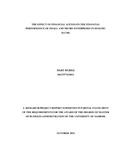| dc.description.abstract | The role of the small and micro enterprises (SMEs) continues to be in the forefront of
policy debates not only in developing countries but also in developed countries in
creation of employment, driving innovation and entrepreneurship, reduction of poverty
and other social challenges. This is more so for SMEs in slums as debate on how to
improve living standard in informal sector attracting a lot of interest. Financial access has
been found to be the blood of small and micro enterprises and a key determinant of
financial performance in developed countries.
The role of ensuring financial access is facilitated by the financial sector that mobilizes
savings and allocates them to economic uses while providing critical information and
discipline for economic agents as well as a mechanism for the allocation and
management of risks and hence influencing firm’s financial performance. Due to the
short term nature of the financing needed by the SMEs in slums, informal and semiformal
financial institutions respond relatively well compared to the formal financial institutions
to provide the required finances. However the effect of finance access to Mukuru slums
SMEs remains unknown with studies neglecting the area. This study therefore sought to
determine the effect of finance access on financial performance of SMEs in Mukuru
slums.
The study adopted descriptive research design. The research data was collected using
questionnaires and secondary data from financial statements. Data was analyzed using
SPSS version 21. The study found that financial access has positive and significant effect
on SMEs financial performance in Mukuru slums. Further, 43% of the SMEs in Mukuru
slums finance their operations from informal financing, 34% from formal sources and
23% from semiformal sources. The study concluded that informal sources of finance lead
to better financial performance on SMEs that formal and semi-formal sources of finance.
The size of the SME and the age were found to have positive and significant effect on
financial performance. The study recommends the formulation of measures to ensure to
facilitate SMEs in slums areas financial access. The policies can involve an establishment
of special fund to cater for slums SMEs financial needs. | en_US |

